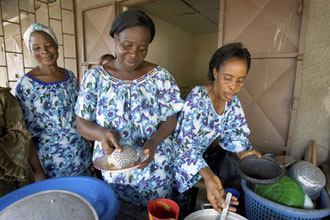
联合国将于2011年6月23日举行第一个国际寡妇日的活动,旨在提供一个机会,使人们特别认识到寡妇及其子女的困境,并通过赋予寡妇权利来确保她们的人权和减轻贫困。
2010年12月,大会宣布6月23日为国际寡妇日。大会决定从2011年起,在每年的6月23日组织国际寡妇日活动,并再三吁请会员国、联合国系统及其他国际和区域组织,在各自职权范围内,特别注意寡妇及其子女的境况。
|
This first International Widows’ Day is an occasion to call attention to the many “firsts” that women must face when their husbands die. In addition to coping with grief, they may find themselves for the first time since marriage without any social safety net. Far too often, widows lack access to inheritance, land tenure, employment and even the means to survive. In places where a widow’s status is linked to her husband, she may find herself suddenly shunned and isolated. Marriage — whether she desires it or not — may be the only way for a widow to regain her footing in society. Of the approximately 245 million widows in our world, more than 115 million live in extreme poverty. In countries embroiled in conflicts, women are often widowed young and must bear the heavy burden of caring for their children amid fighting and displacement with no help or support. Some of these widows are teenagers — or even younger. The death of their husbands can leave a terrible legacy these widows must endure throughout their remaining years. All widows should be protected by the rights enshrined in the Convention on the Elimination of All Forms of Discrimination against Women, and other international human rights treaties. But in reality, interpretations of customary codes, as well as traditional mourning and burial rites, often deny widows virtually all of their universally recognized rights. Despite the many difficulties widows face, many make valuable contributions to their countries and communities. Some take on leadership roles at the highest levels. Others work in their families, taking in orphans, serving as caregivers and reaching across lines of conflict to mend tears in the social fabric. We must recognize the important contribution of widows, and we must ensure that they enjoy the rights and social protections they deserve. Death is inevitable, but we can reduce the suffering that widows endure by raising their status and helping them in their hour of need. This will contribute to promoting the full and equal participation of all women in society. And that will bring us closer to ending poverty and promoting peace around the world. (来源:联合国网站 中国日报网英语点津编辑) |
今年是第一次开展国际寡妇日活动,在这个日子里,我们呼吁人们关注妇女在丈夫死亡后必须“第一次”面对的许多问题。妇女不仅陷入悲痛,而且还可能在结婚后第一次发现她们没有任何社会安全网。寡妇往往不能继承财产,没有土地保有权,不能就业,甚至没有生存的手段。 在寡妇的地位与丈夫紧密相联的地方,寡妇可能发现人们突然躲避她,她陷入孤立无援的境地。无论寡妇是否愿意,结婚可能是她在社会重新立脚的唯一途径。 全世界约有2.45亿寡妇,其中超过1.15亿人生活极端贫困。在冲突不断的国家,妇女往往年轻就守寡,不得不在战火中和颠沛流离的生活中肩负起照顾子女的重担,她们得不到任何帮助或支持。 一些寡妇仍然是少女,有的甚至更年轻。丈夫死亡后,给寡妇们留下的可能是终身噩梦。 《消除对妇女一切形式歧视公约》和其他国际人权条约庄严载有各项权利,应可保护所有寡妇。 但在现实中,对习惯法规的各种解读以及传统的丧葬礼仪往往剥夺了寡妇几乎所有的普遍公认权利。 虽然寡妇面临许多困难,但许多人依然对国家和社区作出了宝贵贡献。一些人在最高级别发挥领导作用。其他人则在家里工作,收养孤儿,照顾他人,跨越冲突线,修补社会组织出现的裂痕。 我们必须承认寡妇的重要贡献,我们必须确保她们享有她们应得的权利和社会保障。 死亡是不可避免的,但我们可以提高寡妇的地位,在她们最需要帮助的时刻帮助她们,减轻她们的痛苦。这将有助于促进所有妇女充分和平等地参与社会。而这又将使我们进一步接近消除贫穷和促进世界和平的目标。
|